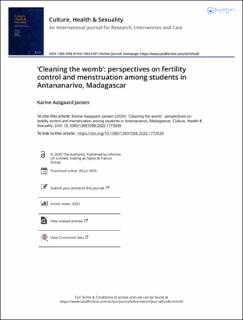| dc.contributor.author | Jansen, Karine Aasgaard | |
| dc.date.accessioned | 2021-07-15T09:33:16Z | |
| dc.date.available | 2021-07-15T09:33:16Z | |
| dc.date.created | 2020-08-25T15:15:26Z | |
| dc.date.issued | 2020 | |
| dc.identifier.issn | 1369-1058 | |
| dc.identifier.uri | https://hdl.handle.net/11250/2764486 | |
| dc.description.abstract | This article discusses students’ perspectives on fertility control, including induced abortion, in Antananarivo, Madagascar. The study draws on a total of nine weeks of ethnographic fieldwork conducted in 2016 and 2017. It argues that while the majority of the students do not refrain from premarital sex, they negotiate their desire for physical intimacy in accordance with the prevailing discourse of premarital abstinence among the Merina ethnic group in the central highlands. In this context, modern contraception, particularly hormonal birth control that could cause menstruation to cease, is considered highly problematic since it was believed capable of creating a ‘blockage’ of the reproductive system which in turn could lead to future infertility. Due to such cultural barriers, there is therefore low coverage and unmet need for contraception among Malagasy students in Antananarivo. Instead, they would rather rely heavily on traditional methods such as periodic abstinence or the calendar method. Moreover, due to the risk of unwanted pregnancy, menstruation is central to the moral control of own and other’s sexual behaviour at both a personal and a collective level. | en_US |
| dc.language.iso | eng | en_US |
| dc.publisher | Taylor & Francis | en_US |
| dc.rights | Attribution-NonCommercial-NoDerivatives 4.0 Internasjonal | * |
| dc.rights.uri | http://creativecommons.org/licenses/by-nc-nd/4.0/deed.no | * |
| dc.title | ‘Cleaning the womb’: perspectives on fertility control and menstruation among students in Antananarivo, Madagascar | en_US |
| dc.type | Journal article | en_US |
| dc.type | Peer reviewed | en_US |
| dc.description.version | publishedVersion | en_US |
| dc.rights.holder | Copyright 2020 the author | en_US |
| cristin.ispublished | true | |
| cristin.fulltext | original | |
| cristin.qualitycode | 1 | |
| dc.identifier.doi | 10.1080/13691058.2020.1773539 | |
| dc.identifier.cristin | 1825084 | |
| dc.source.journal | Culture, Health and Sexuality | en_US |
| dc.identifier.citation | Culture, Health and Sexuality. 2020. | en_US |

